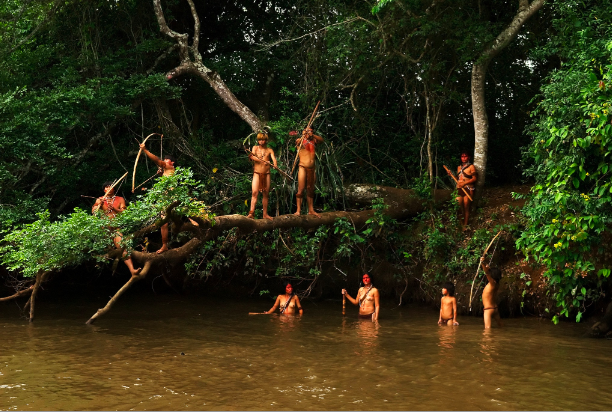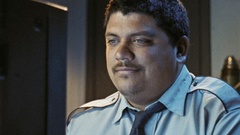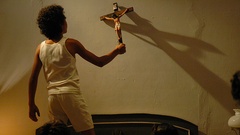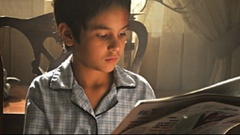¡VAMOS! Festival Film Season: Birdwatchers + After film discussion (2008)

Part of the ¡VAMOS! Festival 2011: Film Season
| Director: | Marco Bechis |
|---|---|
| Certificate: | Unknown |
| Length: | |
| Format: | 35mm |
| Language: | Portuguese, Guarani, English subtitles |
| Country: |
The stunningly beautiful and moving film explores the uneasy relationships formed between the indigenous Guarani peoples and landowners in Mato Grosso Do Sul, Brazil.
FILM FOLLOWED BY A DISCUSSION!
This will be a very special event, as the Vamos Festival has managed to secure a very special after-screening interview/discussion, with 2 specialists of indigenous people.
Fiona Watson Campaigns Director Survival International, who works with the Guarani people, and advised the director for the making of this film, will be interviewedon skype.
And Jared Bowers, who researches Sustainable Community-based Tourism in Guyana at Newcastle University, and who worked as a Tourism Manager for the Iwokrama International Centre for Rainforest Conservation and Development in Guyana, will be present at the screening.
This screening is supported by the Embassy of Brazil in London.
REALITY/FICTION
The film is very much inspired from real events, and attempts to show what the situation is like in Brazil for indigenous tribes. The cast is made of indigenous people, so the film is a mix of reality and fiction.The GUARDIAN wrote a great article about the film, saying:
"The cast had never acted and scripts were impossible, but Chilean director Marco Bechis still managed to make his film about obscure Brazilian Indians."
Birdwatchers "is both a devastating portrait of Brazil's indigenous populations in the 21st century and a tribute to the resistance of the Guaraní-Kaiowá, who are gradually fighting back against the ranchers and farmers who have driven them off their traditional lands."
One of the actors/members of a tribe, interviewed by THE GUARDIAN, said:
" "It wasn't difficult to act, it was my dream," says Vilhava, who plays Nadio, a troubled Kaiowá leader fighting to regain his ancestral lands. "I always dreamed that one day we could show what our situation is like and tell the story of all of our relatives who have been murdered, mistreated and who have never seen justice." "
THE ISSUE
 A great article in THE GUARDIAN explains:
A great article in THE GUARDIAN explains:
"According to anthropologist Rubem Thomas de Almeida, one of Brazil's leading Guaraní specialists, there are currently around 60,000 Guaraní living in Brazil and around 45,000 in Mato Grosso do Sul. Almeida claims that some archeological studies show they may have been in the region since the fourth century. But as Brazil's agricultural frontier advanced throughout the last century, the Guaraní were shunted off their lands by tea planters, sugar-cane farmers and, more recently, soy growers. Today, indigenous leaders continue to fight for the right to return to such areas.
According to Survival International, 517 Guaraní-Kaiowá have committed suicide over the last 20 years, among them a nine-year-old boy. These deaths are blamed partly on the dismal living conditions the Kaiowá are forced to endure, crowded into government reserves or shanty towns on the outskirts of the region's cities.
In September 2009, Amnesty International called for urgent action to prevent a group of 130 Kaiowá, including 60 children, being evicted from their ancestral land in the same region. "The situation of the Guaraní-Kaiowá tribe is one of the most serious in the Americas," says Fiona Watson, Survival's Brazil campaigner, who was involved in setting up contact between Bechis and the Kaiowá. "Despite being one of the largest tribes in Brazil, they have almost no land. Almost every community has experienced violent eviction from their land, which has resulted in shockingly high rates of suicide and malnutrition as the Indians see no future." "
THE PLOT
 The fazendeiros lead a wealthy and leisurely existence. They own huge fields with transgenic plantations and they spend their nights with tourists who come birdwatching.
The fazendeiros lead a wealthy and leisurely existence. They own huge fields with transgenic plantations and they spend their nights with tourists who come birdwatching.
Meanwhile, at the borders of their lands, the uneasiness of the indios, who were the legitimate inhabitants of those lands, is rapidly growing. Enclosed in reserves, with no other perspective except that of working as semi-slaves in sugarbeet plantations, many young people commit suicide. And it is a suicide which stirs up a rebellion.
Led by an indio, Nadio, and by a shaman, a group of Guarani-Kaiowà starts camping outside one of the properties to claim their land back. Two opposing worlds facing each other. They engage a metaphorical as well as a real war. But they never stop studying each other. It’s the young people mainly who are “curious of the other”. A curiosity which will create a deep bond between the young shaman apprentice Osvaldo and a fazendero’s daughter…
ABOUT THE DIRECTOR: MARCO BECHIS

- Before the cinema, he studied Economics at the Bocconi University of Milan, he an was elementary school teacher in Argentina, Polaroid-Photographer in Paris and video-artist in New York.
- In 1982, Marco Bechis created, in collaboration with Amnesty International, a video-installation, “Desaparecidos, dove sono?”, in Milan, on a concentration camp. The film “Garage Olimpo“ was later based on it.
- From 1994 to 1996 he shot in India the documentary film “Luca’s film” dedicated to his friend Luca Pizzorno, sculptor, artist, fotographer, who died the same year. (Locarno Film Festival 1996).
- His second feature film was “Garage Olimpo” (1999), the story of a concentration camp in Argentina during the military dictatorship (52° Festival di Cannes).
- In “Figli/Hijos”, his third feature film, he told the drama of the children of missing Argentinians, who were adopted illegaly from ex-military families (Mostra del Cinema di Venezia del 2001).
- His films received 14 international awards. In 2004 Marco Bechis founded KARTA FILM and started the preparation of “Birdwatchers”, his first film as a producer, in collaboration with Amedeo Pagani’s Classic.
Tickets £5/£3.50 (conc) on the door, or £4.50 advance tickets from here
 PART OF THE VAMOS FILM SEASON (9-30 June 2011)
PART OF THE VAMOS FILM SEASON (9-30 June 2011)
…Showcasing some of the best and unseen recent films from Latin America:
Thu 9 June, 7.30pm: Gigante (2009, Dir. Pablo Stoll, URUGUAY)
Thu 16 June, 7.30pm: Birdwatchers (2008, Dir. Maros Bechis, BRAZIL) + DISCUSSION!
Sat 25 June, 7.30pm: Revolucion (2010, Dir - various, MEXICO) + FUNKY BUTT PARTY!
Thu 30 June, 7.30pm: Abel (2010, Dir. Diego Luna, MEXICO)
This film season featured in the GUARDIAN! Here
Other films in the ¡VAMOS! Festival 2011: Film Season:

09
Film: ¡Vamos! Festival Film Season: Gigante (Uruguay) (2009)
9 Jun 2011, 7:30 p.m.
Part of the very exciting new wave from Uruguay, winner of the best first feature film and the Silver Bear awards at the very prestigious Berlin Film Festival, this is a gorgeous comedy about a security guard in a supermarket.

25
Film: ¡Vamos! Festival Film Season: Revolución + After Party With The Funky Butt Club (2010)
25 Jun 2011, 7:30 p.m.
Ten directors at the forefront of Mexican cinema, including Gael García Bernal, join together to celebrate the 100th anniversary of the Mexican revolution in 10 short films.

30
Film: ¡Vamos! Festival Film Season: Abel (Mexico) (2010)
30 Jun 2011, 7:30 p.m.
First film from Diego Luna, actor in Y Tu Mama Tambien and Milk, this film was selected by the London Film Festival this year, and gathered incredible reviews internationally. This is a very touching comedy-drama about a young 9 year-old who lives in a fantasy world.




